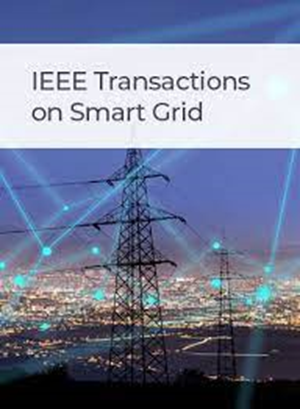Leveraging Time-Causal State Variable Aggregation for Real-Time Schedule of Massive Air Conditioners
IF 8.6
1区 工程技术
Q1 ENGINEERING, ELECTRICAL & ELECTRONIC
引用次数: 0
Abstract
Air conditioner (AC) loads offer promising flexibility for active distribution networks to manage uncertainties, such as those in renewable energy generation, electricity prices, and load demand. However, real-time scheduling of ACs is challenging due to their massive temporal coupling constraints and time-causal uncertainties. To address this, a novel time-causal aggregation-based approximate dynamic programming (TCA-ADP) algorithm is proposed for efficient scheduling. The time-causality requirements for aggregating state variables are first analyzed to align with the real-time sequential decision-making process. Subsequently, an enhanced aggregation model is developed to ensure both high accuracy and adherence to time causality. The aggregation process is further reformulated as a linear program to optimize aggregation parameters and enable tractable computation. Accordingly, the TCA-ADP leverages aggregated state variables to approximate the value function as a new way, balancing computational efficiency and economy against the large value function space of massive ACs. By training the value function offline using historical data, the TCA-ADP efficiently achieves near-optimal real-time scheduling of massive ACs through parallel and closed-form disaggregation. Case studies demonstrate the effectiveness and scalability of the TCA-ADP, highlighting its aggregation accuracy, uncertainty handling, and the trade-off between economy and tractability.基于时间-因果状态变量聚合的大型空调实时调度
空调(AC)负载为主动配电网络提供了良好的灵活性,以管理不确定性,例如可再生能源发电、电价和负载需求。然而,由于ac存在大量的时间耦合约束和时间因果不确定性,其实时调度具有一定的挑战性。为了解决这一问题,提出了一种基于时间因果聚合的近似动态规划(TCA-ADP)算法。首先分析了聚合状态变量的时间因果关系要求,以便与实时顺序决策过程保持一致。随后,开发了一个增强的聚合模型,以确保高精度和遵守时间因果关系。为了优化聚合参数,实现易于处理的计算,将聚合过程重新表述为线性程序。因此,TCA-ADP利用聚合状态变量近似值函数,作为一种新的方法,在计算效率和经济性与大量ac的大值函数空间之间取得平衡。通过使用历史数据离线训练值函数,TCA-ADP通过并行和封闭形式的分解有效地实现了大规模ac的近最优实时调度。案例研究证明了TCA-ADP的有效性和可扩展性,突出了其聚合准确性、不确定性处理以及经济性和可追溯性之间的权衡。
本文章由计算机程序翻译,如有差异,请以英文原文为准。
求助全文
约1分钟内获得全文
求助全文
来源期刊

IEEE Transactions on Smart Grid
ENGINEERING, ELECTRICAL & ELECTRONIC-
CiteScore
22.10
自引率
9.40%
发文量
526
审稿时长
6 months
期刊介绍:
The IEEE Transactions on Smart Grid is a multidisciplinary journal that focuses on research and development in the field of smart grid technology. It covers various aspects of the smart grid, including energy networks, prosumers (consumers who also produce energy), electric transportation, distributed energy resources, and communications. The journal also addresses the integration of microgrids and active distribution networks with transmission systems. It publishes original research on smart grid theories and principles, including technologies and systems for demand response, Advance Metering Infrastructure, cyber-physical systems, multi-energy systems, transactive energy, data analytics, and electric vehicle integration. Additionally, the journal considers surveys of existing work on the smart grid that propose new perspectives on the history and future of intelligent and active grids.
 求助内容:
求助内容: 应助结果提醒方式:
应助结果提醒方式:


